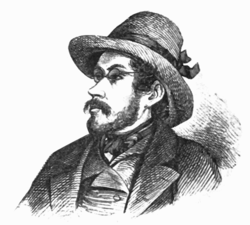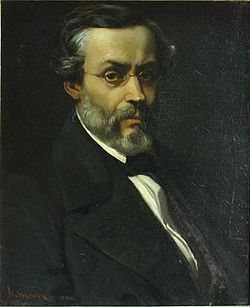
Cezar Bolliac
Encyclopedia


Wallachia
Wallachia or Walachia is a historical and geographical region of Romania. It is situated north of the Danube and south of the Southern Carpathians...
n and Romania
Romania
Romania is a country located at the crossroads of Central and Southeastern Europe, on the Lower Danube, within and outside the Carpathian arch, bordering on the Black Sea...
n radical
Radicalism (historical)
The term Radical was used during the late 18th century for proponents of the Radical Movement. It later became a general pejorative term for those favoring or seeking political reforms which include dramatic changes to the social order...
political figure, amateur archaeologist
Archaeology
Archaeology, or archeology , is the study of human society, primarily through the recovery and analysis of the material culture and environmental data that they have left behind, which includes artifacts, architecture, biofacts and cultural landscapes...
, journalist and Romantic
Romanticism
Romanticism was an artistic, literary and intellectual movement that originated in the second half of the 18th century in Europe, and gained strength in reaction to the Industrial Revolution...
poet.
Early life
Born in BucharestBucharest
Bucharest is the capital municipality, cultural, industrial, and financial centre of Romania. It is the largest city in Romania, located in the southeast of the country, at , and lies on the banks of the Dâmbovița River....
as the son of Anton Bogliako (Bogliacco or Bolliac), a Greek
Greeks in Romania
There has been a Greek presence in Romania for at least 27 centuries. At times, as during the Phanariote era, this presence has amounted to hegemony; at other times , the Greeks have simply been one among the many ethnic minorities in Romania.-Ancient and Medieval Period:The Greek presence in what...
-Italian
Italian people
The Italian people are an ethnic group that share a common Italian culture, ancestry and speak the Italian language as a mother tongue. Within Italy, Italians are defined by citizenship, regardless of ancestry or country of residence , and are distinguished from people...
physician, and his wife Zinca Pereţ, who remarried the stolnic
Stolnic
Stolnic was a boier rank and the position at the court in the history of Romania: in Moldavia and Wallachia. The title approximately corresponds to seneschal and is borrowed from the Slavic title stolnik a person in charge of the royal table.The title mare stolnic means "great stolnic", or...
Petrache Pereţ; his adoptive father took care of Cezar's education. After being taught reading and writing at home, Bolliac studied at the Saint Sava Academy, under Ion Heliade Rădulescu
Ion Heliade Radulescu
Ion Heliade Rădulescu or Ion Heliade was a Wallachian-born Romanian academic, Romantic and Classicist poet, essayist, memoirist, short story writer, newspaper editor and politician...
- Rădulescu was to become one of his most important collaborators.
In 1830, he joined the newly-refounded Wallachian Army as a member of its officer corps. Three years later, Bolliac became a member of the secret
Secret society
A secret society is a club or organization whose activities and inner functioning are concealed from non-members. The society may or may not attempt to conceal its existence. The term usually excludes covert groups, such as intelligence agencies or guerrilla insurgencies, which hide their...
Philharmonic Society, created by Ion Câmpineanu, Rădulescu, and Constantin Aristia.
In 1835, he published his first lyrical works. A year later, he began editing the review Curiosul.
Frăţia and manifestos
With fellow radicals Nicolae BălcescuNicolae Balcescu
Nicolae Bălcescu was a Romanian Wallachian soldier, historian, journalist, and leader of the 1848 Wallachian Revolution.-Early life:...
and Eftimie Murgu
Eftimie Murgu
Eftimie Murgu was a Romanian politician who took part in the 1848 Revolutions.He was born in Rudăria to Samu Murgu, an officer in the Imperial Army and Cumbria Murgu...
, Bolliac joined in Mitică Filipescu's conspiracy
Conspiracy (political)
In a political sense, conspiracy refers to a group of persons united in the goal of usurping or overthrowing an established political power. Typically, the final goal is to gain power through a revolutionary coup d'état or through assassination....
against Prince Alexandru II Ghica
Alexandru II Ghica
Alexandru II or Alexandru D. Ghica , a member of the Ghica family, was Prince of Wallachia from April 1834 to 7 October 1842 and later caimacam from July 1856 to October 1858....
and, later in the year, entered the Freemasonry
Freemasonry
Freemasonry is a fraternal organisation that arose from obscure origins in the late 16th to early 17th century. Freemasonry now exists in various forms all over the world, with a membership estimated at around six million, including approximately 150,000 under the jurisdictions of the Grand Lodge...
-inspired Frăţia ("Brotherhood") secret society
Secret society
A secret society is a club or organization whose activities and inner functioning are concealed from non-members. The society may or may not attempt to conceal its existence. The term usually excludes covert groups, such as intelligence agencies or guerrilla insurgencies, which hide their...
.
In 1844, through the means of Foaie pentru minte, inimă şi literatură, he appealed to young writers:
- "The times of PetrarchPetrarchFrancesco Petrarca , known in English as Petrarch, was an Italian scholar, poet and one of the earliest humanists. Petrarch is often called the "Father of Humanism"...
are over, gentlemen poets! The century demands progress, propagandaPropagandaPropaganda is a form of communication that is aimed at influencing the attitude of a community toward some cause or position so as to benefit oneself or one's group....
for the great idea, propaganda for the true charity that we lack entirely. (...) Form societies, declare, write down, praise, satirise, start working with all intellectual and moral devices, and the enslavement shall crumble, for it is half-crumbled, and you gentlemen shall be given the blessings of future generations as true apostles of the heavenly mission, of brotherhood and freedom."
In an article he published in 1846 in the pages of the same magazine, Bolliac showed his admiration for the works and attitues of Victor Hugo
Victor Hugo
Victor-Marie Hugo was a Frenchpoet, playwright, novelist, essayist, visual artist, statesman, human rights activist and exponent of the Romantic movement in France....
, which he recommended as a guide to Wallachian writers.
Revolution and later life
Consequently, he was one of the leaders of the 1848 Wallachian revolution, and took exile after the OttomanOttoman Empire
The Ottoman EmpireIt was usually referred to as the "Ottoman Empire", the "Turkish Empire", the "Ottoman Caliphate" or more commonly "Turkey" by its contemporaries...
-Russian intervention in September. In Braşov
Brasov
Brașov is a city in Romania and the capital of Brașov County.According to the last Romanian census, from 2002, there were 284,596 people living within the city of Brașov, making it the 8th most populated city in Romania....
, Transylvania
Transylvania
Transylvania is a historical region in the central part of Romania. Bounded on the east and south by the Carpathian mountain range, historical Transylvania extended in the west to the Apuseni Mountains; however, the term sometimes encompasses not only Transylvania proper, but also the historical...
(on Austrian
Austrian Empire
The Austrian Empire was a modern era successor empire, which was centered on what is today's Austria and which officially lasted from 1804 to 1867. It was followed by the Empire of Austria-Hungary, whose proclamation was a diplomatic move that elevated Hungary's status within the Austrian Empire...
domain), Bolliac began publishing Espatriatul, a paper which featured the subtitle Dreptate, Frăţie ("Justice, Brotherhood"), a rendition of the revolutionary slogan. After 1857, he settled in Paris
Paris
Paris is the capital and largest city in France, situated on the river Seine, in northern France, at the heart of the Île-de-France region...
, and published the French-language
French language
French is a Romance language spoken as a first language in France, the Romandy region in Switzerland, Wallonia and Brussels in Belgium, Monaco, the regions of Quebec and Acadia in Canada, and by various communities elsewhere. Second-language speakers of French are distributed throughout many parts...
poem Domnul Tudor. Episode de la révolution roumaine de 1821 ("Voivode Tudor
Tudor Vladimirescu
Tudor Vladimirescu was a Wallachian Romanian revolutionary hero, the leader of the Wallachian uprising of 1821 and of the Pandur militia. He is also known as Tudor din Vladimiri or — occasionally — as Domnul Tudor .-Background:Tudor was born in Vladimiri, Gorj County in a family of landed peasants...
. An Episode of the 1821 Romanian Revolution"), and began issuing his review Buciumul, a mainly political magazine.
He returned to Wallachia in 1858, after the Crimean War
Crimean War
The Crimean War was a conflict fought between the Russian Empire and an alliance of the French Empire, the British Empire, the Ottoman Empire, and the Kingdom of Sardinia. The war was part of a long-running contest between the major European powers for influence over territories of the declining...
had led to a drastic decrease in Russian influence (allowing for radicals to regin their country), and took an archaeological study trip. He included the results of his investigations in Buciumul and its successor Trompeta Carpaţilor (he began editing the latter in 1865). During the period, Bolliac also engaged in activism in favor of Wallachia's union with Moldavia
Moldavia
Moldavia is a geographic and historical region and former principality in Eastern Europe, corresponding to the territory between the Eastern Carpathians and the Dniester river...
, a goal reached under Alexander John Cuza
Alexander John Cuza
Alexander John Cuza was a Moldavian-born Romanian politician who ruled as the first Domnitor of the United Principalities of Moldavia and Wallachia between 1859 and 1866.-Early life:...
. He later became a notorious antisemite
Anti-Semitism
Antisemitism is suspicion of, hatred toward, or discrimination against Jews for reasons connected to their Jewish heritage. According to a 2005 U.S...
, rejected the idea of naturalization
Naturalization
Naturalization is the acquisition of citizenship and nationality by somebody who was not a citizen of that country at the time of birth....
for the Jews, and engaged in a polemic
Polemic
A polemic is a variety of arguments or controversies made against one opinion, doctrine, or person. Other variations of argument are debate and discussion...
over this issue (and that of his version of Romanticism in general) with Junimea
Junimea
Junimea was a Romanian literary society founded in Iaşi in 1863, through the initiative of several foreign-educated personalities led by Titu Maiorescu, Petre P. Carp, Vasile Pogor, Theodor Rosetti and Iacob Negruzzi...
s Titu Maiorescu
Titu Maiorescu
Titu Liviu Maiorescu was a Romanian literary critic and politician, founder of the Junimea Society. As a literary critic, he was instrumental in the development of Romanian culture in the second half of the 19th century....
.
He died in Bucharest, by then the capital of the Kingdom of Romania
Kingdom of Romania
The Kingdom of Romania was the Romanian state based on a form of parliamentary monarchy between 13 March 1881 and 30 December 1947, specified by the first three Constitutions of Romania...
.
Published volumes
- Operile lui Cezar Boliac. Meditaţii ("The Works of Cezar Boliac. Musings", 1835)
- Din poeziile lui Kesar Boliak ("Selected Poems of Kesar Boliak", 1843)
- Poezii nouă ("New Poems", 1847)
- Poezii umanitare ("Humanitarian Poems", 1866)

